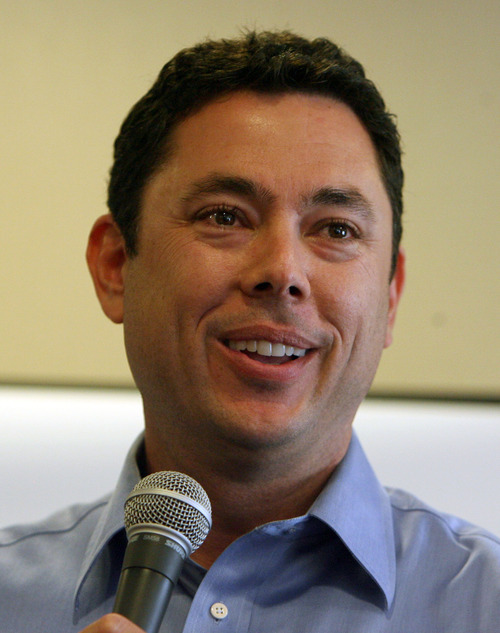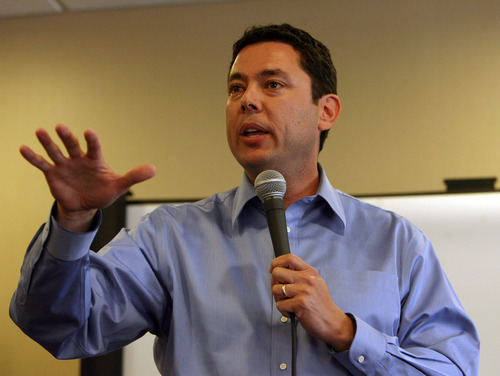This is an archived article that was published on sltrib.com in 2011, and information in the article may be outdated. It is provided only for personal research purposes and may not be reprinted.
In bowing out of a U.S. Senate clash with Orrin Hatch on Monday, Jason Chaffetz avoided what he said would be a "multimillion-dollar bloodbath," but predicts Hatch is not in the clear.
"I think he's vulnerable," Chaffetz said. "He's got a major task ahead of him in convincing Utahns he's still the right guy for that job. I think he's got a serious threat of [Democratic Rep.] Jim Matheson running against him, a serious campaign, and another insurgent campaign on the Republican side."
Chaffetz ended months of speculation Monday, announcing that he would pass on a Senate bid and instead seek re-election to his House seat.
"If I were to run an interparty battle it would be a multimillion-dollar bloodbath," Chaffetz said Monday. "I don't think that's necessarily in my best interests. I don't think it's in the best interest of our party, the nation or our state."
He said a few short months ago he was almost certain to get into the race. He had circled Sept. 27 on his calendar to make his announcement. He was dissuaded from running, he said, by his high-profile role in the recent debt ceiling debate.
Chaffetz was the sponsor of the Cut, Cap and Balance proposal, which advocated slashing spending and passing a balanced budget amendment. He was a spokesman for the effort on numerous national television programs, a heady assignment for the second-term congressman.
He said he was encouraged by members of the House leadership team, including House Speaker John Boehner, to stay put in the House, and he said he plans to seek re-election to his seat.
"I could spend the next 15 months campaigning to do Senator Hatch's job, or I could spend those 15 months doing the job I was elected to do," Chaffetz said. "I think my chances were very, very good at beating Senator Hatch. We'll never know for sure because I'm going to focus on the House."
Hatch, a six-term incumbent, is widely seen as vulnerable to a conservative challenger and despite Chaffetz passing on the race, other contenders are expected to emerge.
"It surprised us but it won't dissuade us," said David Kirkham, a leader in Utah's tea party movement. He said his phone hasn't stopped ringing since Chaffetz's decision became public and three people have told him they want to challenge Hatch.
"I know he'll be challenged," Kirkham said. "Where it's going to go, I don't know. I think it's going to be a tough race. I think it's going to be tough for Hatch and tough for a challenger."
Hatch's campaign manager, Dave Hansen, acknowledges that polls showed Chaffetz was the strongest challenger, but he doesn't think Hatch now has a clear path to re-election.
"It's certainly not a time to say we've made it through our biggest challenge and sit back. We're going to increase our efforts here," Hansen said.
Quin Monson, associate director of the Center for the Study of Elections and Democracy at Brigham Young University, said that Chaffetz's decision not to run for Senate is "the best possible news [Hatch] could have."
"It takes his thorniest problem off the table," Monson said. "I don't think he's out of the woods, but there has only been one other serious challenger who has talked about going against him and he hasn't raised any money."
Utah Sen. Dan Liljenquist, R-Bountiful, has expressed interest in a U.S. Senate bid, but has not decided whether to run.
Matheson is also contemplating a bid.
"I am engaged in the same sort of thoughtful process, independent of Jason's decision," Matheson said. "I am proud to advocate for our state. Many have encouraged me to run for statewide office, and I am currently evaluating the opportunities to best continue my work."
The relationship between Hatch and Chaffetz has been rocky from the start. Hatch backed former Rep. Chris Cannon when Chaffetz challenged him in 2008, and Chaffetz said he has met with Hatch only three times since he has been in office. He said the Utah delegation is "dysfunctional" and Hatch, as its senior member, is not leading.
A Tribune poll conducted earlier this month showed Hatch with a 10-point lead over Chaffetz among Republican voters. However, that assumes Hatch could force Chaffetz to a primary.
Under Utah's nominating system, roughly 3,500 Republican delegates — generally the most conservative members of the party — would get the first crack at choosing the candidate. If Chaffetz could win support from 60 percent of them, he could win the nomination outright without having to face Hatch in the primary. Those delegates rallied in 2010 to oust three-term incumbent Sen. Bob Bennett at the state convention. Sen. Mike Lee went on to win the seat.
In May, Chaffetz was telling Utah politicos he planned to run against Hatch. He was lining up conservative support from Washington, D.C., interest groups and had started formulating his message for the campaign.
Several Utah legislators and other ambitious politicians — such as Rep. Stephen Sandstrom, R-Orem, Rep. Chris Herrod, R-Provo, former Rep. Morgan Philpot and others — assuming Chaffetz was running, had already started making plans of their own to run for the 3rd Congressional District seat and may now have to reconsider their options.
"I was absolutely convinced that Chaffetz was going to run against Hatch," Sandstrom said. "I was 100 percent convinced."
He quickly engaged in a strategy session with Alan Crooks, a campaign consultant, who said "nothing is off the table" for what Sandstrom might still run for now that Chaffetz will defend his congressional seat — but Sandstrom said he wouldn't challenge Chaffetz.
gehrke@sltrib.comTwitter: @RobertGehrke
David Montero contributed to this report.





